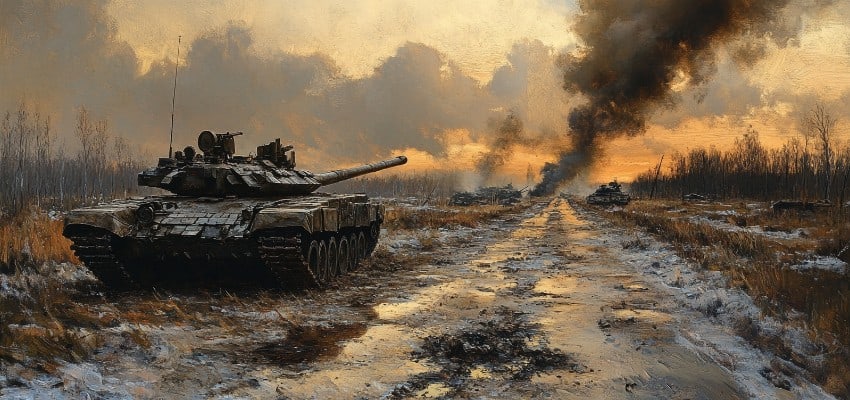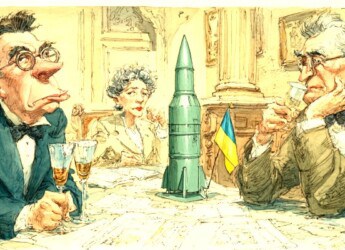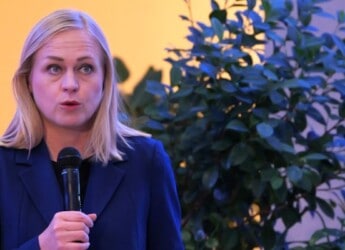Editor’s Note: The following report provides a concise analysis of the developments in the Russo-Ukrainian War for October 5-6, 2024. Derived from the Institute for the Study of War’s assessments, this article examines the critical elements influencing the war’s current trajectory, including significant Russian equipment losses, Ukrainian counteroffensives, internal pressures on the Russian military, and ongoing efforts to document Russian war crimes. The report aims to offer a factual account for an informed audience familiar with military and geopolitical issues.
For those seeking to grasp the full scope of this evolving landscape, the complete updates from the Institute for the Study of War serve as an invaluable resource.
Content Assessment: Cracks in the Kremlin’s War Machine - Equipment Losses, War Crimes, and Social Media Crackdowns
Information - 92%
Insight - 91%
Relevance - 90%
Objectivity - 92%
Authority - 94%
92%
Excellent
A short percentage-based assessment of the qualitative benefit expressed as a percentage of positive reception of the recent article from ComplexDiscovery OÜ titled, "Cracks in the Kremlin’s War Machine: Equipment Losses, War Crimes, and Social Media Crackdowns."
Background Note: ComplexDiscovery’s staff offers distinctive perspectives on the Russo-Ukrainian war and Iran-Israel conflict, informed by military experience on the West German, East German, and Czechoslovakian border during the Cold War and in Sinai as part of Camp David Accord compliance activities. This firsthand regional knowledge has been further enhanced by recent staff travels to Eastern European countries, including Estonia, Latvia, Lithuania, and Poland. These visits have provided up-to-date, on-the-ground insights into the current geopolitical climate in regions directly impacted by the ongoing conflict.
Combined with cybersecurity, information governance, and eDiscovery proficiency, this multifaceted experience enables comprehensive analysis of these conflicts, including the critical impact of cyber warfare, disinformation, and digital forensics on modern military engagements. This unique background positions ComplexDiscovery to provide valuable insights for conflict-related investigations and litigation, where understanding the interplay of technology, data, and geopolitical factors is crucial.
Russo-Ukrainian Conflict Update*
Cracks in the Kremlin’s War Machine: Equipment Losses, War Crimes, and Social Media Crackdowns
ComplexDiscovery Staff
As the Russo-Ukrainian War grinds on into late 2024, the cracks in Russia’s war machine are becoming increasingly visible. In particular, the staggering loss of over five divisions’ worth of armored vehicles is emblematic of the broader logistical and strategic challenges facing the Kremlin. With Ukrainian forces pushing back in key regions and Russian recruitment efforts faltering despite heavy financial incentives, the war is entering a critical phase where both sides must grapple with the limits of their resources. Alongside these developments, Russia’s internal efforts to tighten control over its information space reflect mounting concerns over maintaining public support and managing dissent.
This report explores these unfolding dynamics, focusing on Russia’s vehicle losses, Ukrainian counteroffensive operations, the prosecution of Russian war crimes, and the Kremlin’s growing control over social media—a telling sign of deeper internal strain.
Heavy Russian Equipment Losses in Pokrovsk Raion
Russian forces have reportedly suffered significant equipment losses in their efforts to seize Avdiivka, which began in October 2023. Open-source intelligence reveals that Russian forces have lost over 1,800 pieces of heavy equipment in Pokrovsk Raion alone. These losses include 539 tanks and over 1,000 infantry fighting vehicles. Ukrainian forces are credited with destroying the majority of these vehicles, amounting to over five divisions’ worth of Russian equipment. This attrition has occurred as Russia has launched offensive operations not only in Avdiivka but also in the surrounding areas of western Donetsk Oblast.
The rate of Russian vehicle loss is unsustainable, particularly given the constraints on Russia’s defense industrial base. The depletion of Soviet-era stockpiles and production limitations may force Russia to reconsider its mechanized strategies. Russian forces have increasingly relied on infantry assaults in the region, potentially signaling a shift due to the depletion of armored capabilities.
Ukrainian Counteroffensives in Kursk and Donetsk
Ukrainian forces continue to launch counteroffensive operations along key frontlines, including in Kursk Oblast. Ground assaults occurred in Glushkovsky Raion, where both Ukrainian and Russian forces clashed near Veseloye, Novy Put, and Medvezhye. Although no major territorial advances were confirmed, Russian forces made minor gains southeast of Korenevo in the salient, reinforcing their positions.
In Donetsk, intense fighting continues as Russian forces attempt to capture the entirety of the oblast. Russian troops engaged in offensive operations near Toretsk and Pokrovsk, though their advances were limited. Ukrainian forces are actively resisting these offensives, with reports of Ukrainian missile strikes targeting Russian command posts in the region, utilizing Storm Shadow and GMLRS missiles.
Russian War Crimes and Ukrainian Prosecution Efforts
The Ukrainian government continues to uncover and prosecute Russian war crimes, particularly against Ukrainian prisoners of war (POWs). On October 4, Ukrainian authorities announced that Russian forces had executed 93 Ukrainian POWs since the invasion began, with 80% of these executions occurring in 2024 alone. The Geneva Convention prohibits such actions, yet these war crimes appear to be systemic, with high-ranking Russian officials condoning them.
Additionally, a recent Ukrainian investigation has focused on the execution of four Ukrainian POWs by Russian commanders at the Vovchansk aggregate plant in the summer of 2024. Testimonies from Russian POWs under Ukrainian custody have helped advance the pre-trial investigation. Ukrainian authorities have returned over 3,600 POWs and civilians through exchanges, but many remain in captivity under harsh conditions.
Russian Government’s Efforts to Deanonymize Social Media Accounts
The Russian government has recently taken steps to further control its domestic information space by introducing a plan to deanonymize social media accounts with a significant following. On October 4, 2024, Russian federal censor Roskomnadzor and the Ministry of Finance published a draft resolution that requires social media pages with more than 10,000 subscribers to register their identity and contact information with the government.
Under this new resolution, account holders are required to submit personal details such as their full name, phone number, and email address through government portals. Additionally, these social media pages would be marked as “verified” by the Russian government, and the owners would be required to display a link to Roskomnadzor’s verification list. Crucially, unverified accounts would be barred from advertising or accepting donations, a significant enforcement mechanism as many prominent Russian bloggers rely on advertisements and donations to sustain their operations, particularly those covering the war in Ukraine.
This plan, however, has been met with widespread criticism, especially from the ultranationalist milblogger community, which has been documenting the war and voicing pro-war narratives. Milbloggers argued that the draft law could lead to further censorship of the Russian-language internet and stifle independent war coverage. The backlash prompted Roskomnadzor to revise the initial draft, which originally demanded even more stringent measures, including the submission of IP addresses. Although the updated proposal reflects some concessions, it still represents a broader Kremlin effort to tighten control over online discourse in Russia and encourage self-censorship among influential voices critical of the government or military.
Notably, major Kremlin-linked milbloggers such as Rybar and Sasha Kots have refrained from publicly commenting on this issue, indicating that even highly influential figures may be treading cautiously in the face of increasing censorship. This growing suppression of dissent within the pro-war information space is part of a larger trend in which the Russian government is attempting to regulate critical voices while maintaining control over the narrative surrounding its war in Ukraine.
Internal Pressures on the Russian Military Command
The Russian government’s ongoing efforts to replenish its forces through crypto-mobilization and financial incentives are facing diminishing returns. The Kremlin has allocated 90 billion rubles (approximately $948 million) for contract payments between 2025 and 2027, aiming to recruit around 225,000 new personnel. However, recent increases in financial incentives suggest that these recruitment efforts are failing to meet the required numbers.
Russian authorities have expressed concerns over the sustainability of these recruitment drives, indicating that the Kremlin’s crypto-mobilization strategy is not sufficient to maintain the manpower necessary for prolonged high-intensity operations in Ukraine. The Russian command’s reluctance to declare another partial mobilization, despite the worsening manpower crisis, suggests that they remain wary of the political repercussions of a broader call-up, akin to the unpopular mobilization in the fall of 2022.
Cracks in the War Machine
As the war approaches its third year, the scale of Russia’s military losses has grown increasingly unsustainable. The Kremlin’s efforts to plug gaps in its manpower and vehicle shortages with financial incentives and recruitment drives seem insufficient in the face of mounting operational failures. Meanwhile, Ukraine’s counteroffensives are gradually reclaiming key positions, and the international community continues to pressure Russia over its systematic war crimes. Most revealing, however, is the Kremlin’s tightening grip on information, as seen in its efforts to deanonymize and control social media accounts. This attempt to suppress dissent amid faltering military efforts underscores a broader truth: Russia’s war machine, now visibly cracking under the strain of sustained conflict, is grappling with both internal and external challenges that may shape the conflict’s outcome.
News Sources
As a leading source for cybersecurity, information governance, and legal discovery insights, including international investigations and litigation, ComplexDiscovery OÜ recognizes the importance of awareness regarding alleged and documented criminal acts, particularly in the context of the Russia-Ukraine conflict. While we, following the lead of the Institute for the Study of War (ISW), do not provide detailed coverage of war crimes in our primary reports, we encourage professionals within the eDiscovery ecosystem to stay informed about these activities. This awareness is crucial for understanding potential future legal actions and responsibilities.
Detailed Reporting with Maps for October 5-6, 2024, from the ISW – Mouseover to Scroll
Russo-Ukrainian War Update - October 5-6 2024 - TruncatedReview the Detailed Reporting and Maps PDF
About the Institute for the Study of War Research Methodology
ISW’s research methodology relies on both primary and secondary sources, enabling researchers to develop a comprehensive understanding of the situation on the ground. In order to analyze military and political developments in any given area, ISW’s research analysts must wholly understand the systems of enemy and friendly forces. They must also understand the population demographics, physical terrain, politics, and history of that area. This lays the analytical foundation for understanding the reasons for particular developments and fulfilling their assigned research objectives. ISW analysts also spend time in places like Iraq, Afghanistan, and elsewhere in order to gain a better understanding of the security and political situation and to evaluate the implementation of current strategies and policies. Our researchers compile data and analyze trends, producing a granular analysis of developments in areas of research, producing an accurate, high-resolution, timely, and thorough picture of the situation. ISW’s research methodology guarantees its success and commitment to improving the nation’s ability to execute military operations, achieve strategic objectives, and respond to emerging problems that may require the use of American military power.
About the Institute for the Study of War
The Institute for the Study of War advances an informed understanding of military affairs through reliable research, trusted analysis, and innovative education. They are committed to improving the nation’s ability to execute military operations and respond to emerging threats in order to achieve U.S. strategic objectives. ISW is a non-partisan, non-profit, public policy research organization.
Learn more, get involved, and contribute today.
Additional Reading
- From Dissent to OSINT? Understanding, Influencing, and Protecting Roles, Reputation, and Revenue
- [Annual Update] International Cyber Law in Practice: Interactive Toolkit
- Data Embassies: Sovereignty, Security, and Continuity for Nation-States
Assisted by GAI and LLM Technologies
* Sourced and shared with direct express permission from the Institute for the Study of War (ISW).
Source: ComplexDiscovery OÜ



























